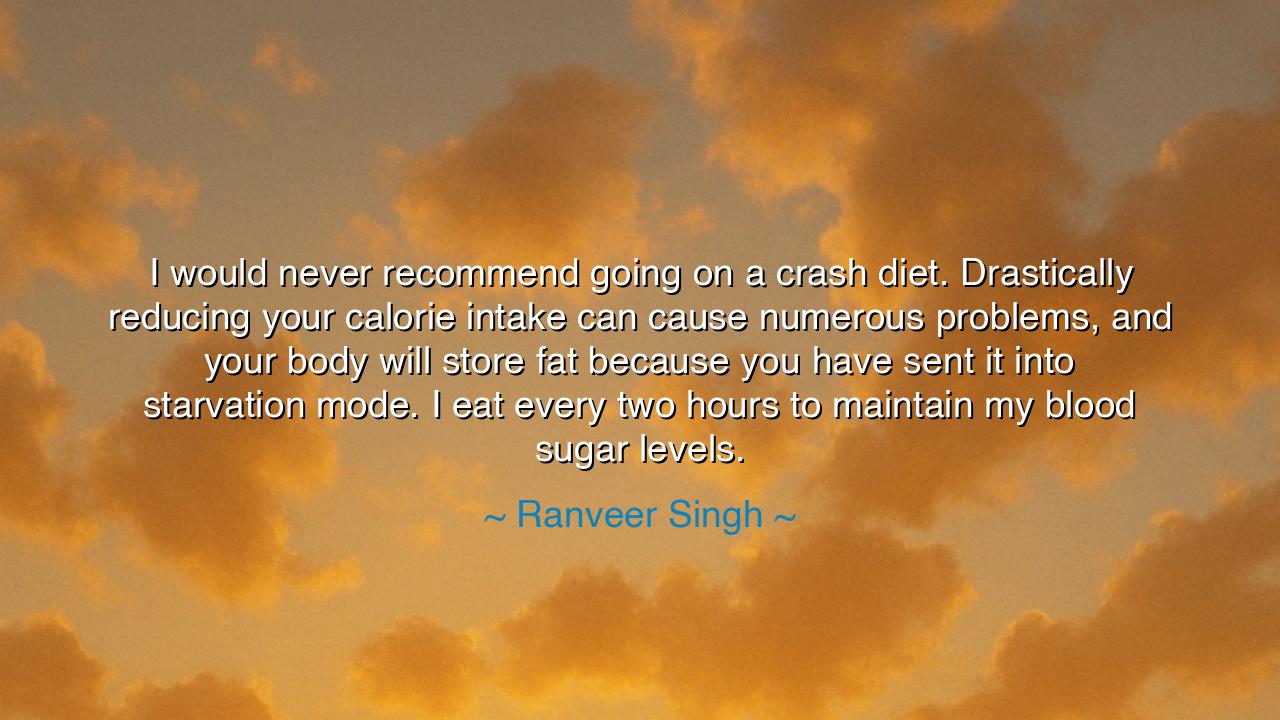
I would never recommend going on a crash diet. Drastically
I would never recommend going on a crash diet. Drastically reducing your calorie intake can cause numerous problems, and your body will store fat because you have sent it into starvation mode. I eat every two hours to maintain my blood sugar levels.






In the words of Ranveer Singh, “I would never recommend going on a crash diet. Drastically reducing your calorie intake can cause numerous problems, and your body will store fat because you have sent it into starvation mode. I eat every two hours to maintain my blood sugar levels.” These are not mere words about food and fitness—they are a parable about balance, a warning against extremes, and a call to harmony between body, mind, and discipline. For in every age, mankind has sought the quickest path to transformation, forgetting that the quickest path often leads through ruin rather than renewal.
Long ago, the ancient healers of Greece spoke of the “Golden Mean,” a sacred balance in all things. Aristotle taught that virtue lies not in excess, nor in deficiency, but in moderation. Just as too much water drowns the roots, and too little starves them, so too the body suffers when deprived or overindulged. Ranveer Singh’s wisdom echoes that same timeless truth: that to starve the body is to betray its rhythm, and to deny nourishment is to invite decay. The body, like a loyal guardian, learns to defend itself in deprivation—it stores what it fears to lose, clinging to fat as a fortress against famine.
There is an ancient story of a warrior who sought to purify himself before battle. He fasted for days, believing hunger would make him sharper, purer, closer to the divine. But when the hour of combat came, his strength failed him; his sword grew heavy, his vision dim. He learned, too late, that willpower alone cannot sustain an empty vessel. His faith was strong, but his body, the sacred temple of that faith, had been neglected. The lesson he paid for in defeat is the same lesson Ranveer speaks of: the body and soul are allies, not adversaries. To mistreat one is to weaken both.
In contrast, the wise cultivate consistency. They know that discipline is not denial, but devotion—a steady tending of the fire so that it burns bright and long. Ranveer’s practice of eating every two hours is not indulgence; it is mastery. It shows reverence for the body’s cycles, understanding that stability of blood sugar sustains clarity of mind, steadiness of emotion, and strength of purpose. To nourish oneself regularly is to respect the divine machinery within.
The ancients might have called this “the rhythm of life.” The body thrives on rhythm—the rise and fall of breath, the pulse of the heart, the turning of the sun. When we eat with awareness and restraint, we honor this rhythm; when we starve or binge, we break it. Thus, the art of eating becomes an act of spiritual alignment, where food is not an enemy but a messenger of life’s balance. Even in ancient Japan, the samurai practiced “hara hachi bu”—to eat until only 80% full—preserving both strength and serenity. They knew that mastery of self began with mastery of appetite.
The modern world tempts us with shortcuts: crash diets, miracle cleanses, and hollow promises of rapid change. Yet, as time has shown, such paths are paved with fatigue, despair, and disillusionment. True transformation is slow, deliberate, and patient. Like a tree that grows a little each day, unseen yet unstoppable, so must we nourish our progress—bit by bit, breath by breath, meal by meal. The hero’s journey is not to starve the self, but to understand it deeply, to listen to the whispers of hunger and respond with wisdom.
Let the lesson be this: balance is strength. To care for the body is not vanity, but gratitude—for this vessel carries our dreams and labors through the world. Feed it not with greed, but with reverence. Drink water when thirsty, rest when weary, eat when hungry, and honor the cycles that sustain you. Avoid the false extremes of neglect and indulgence alike. Seek harmony in all things, and you will find that both health and peace follow in your footsteps.
And so, let every reader take this teaching to heart: do not chase transformation through suffering. Feed your body as you would feed your spirit—with care, with rhythm, with respect. For he who learns to balance hunger and nourishment learns to balance life itself.






AAdministratorAdministrator
Welcome, honored guests. Please leave a comment, we will respond soon